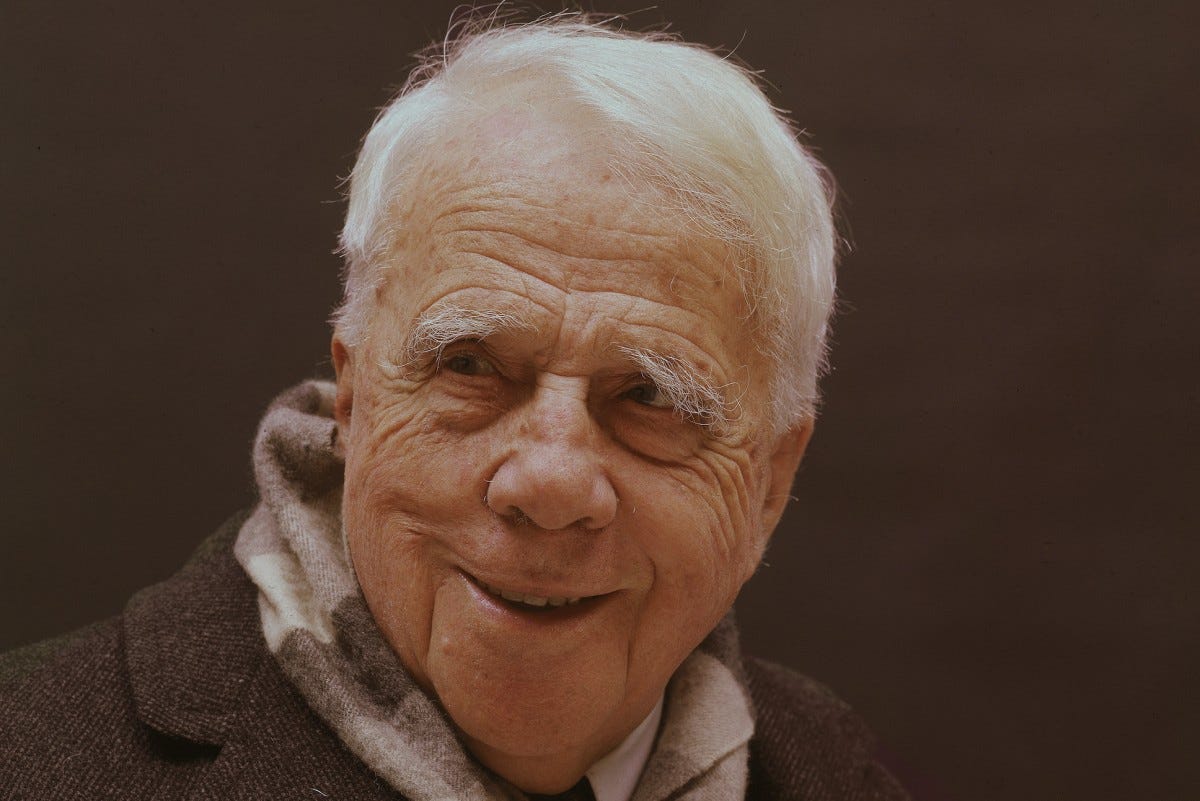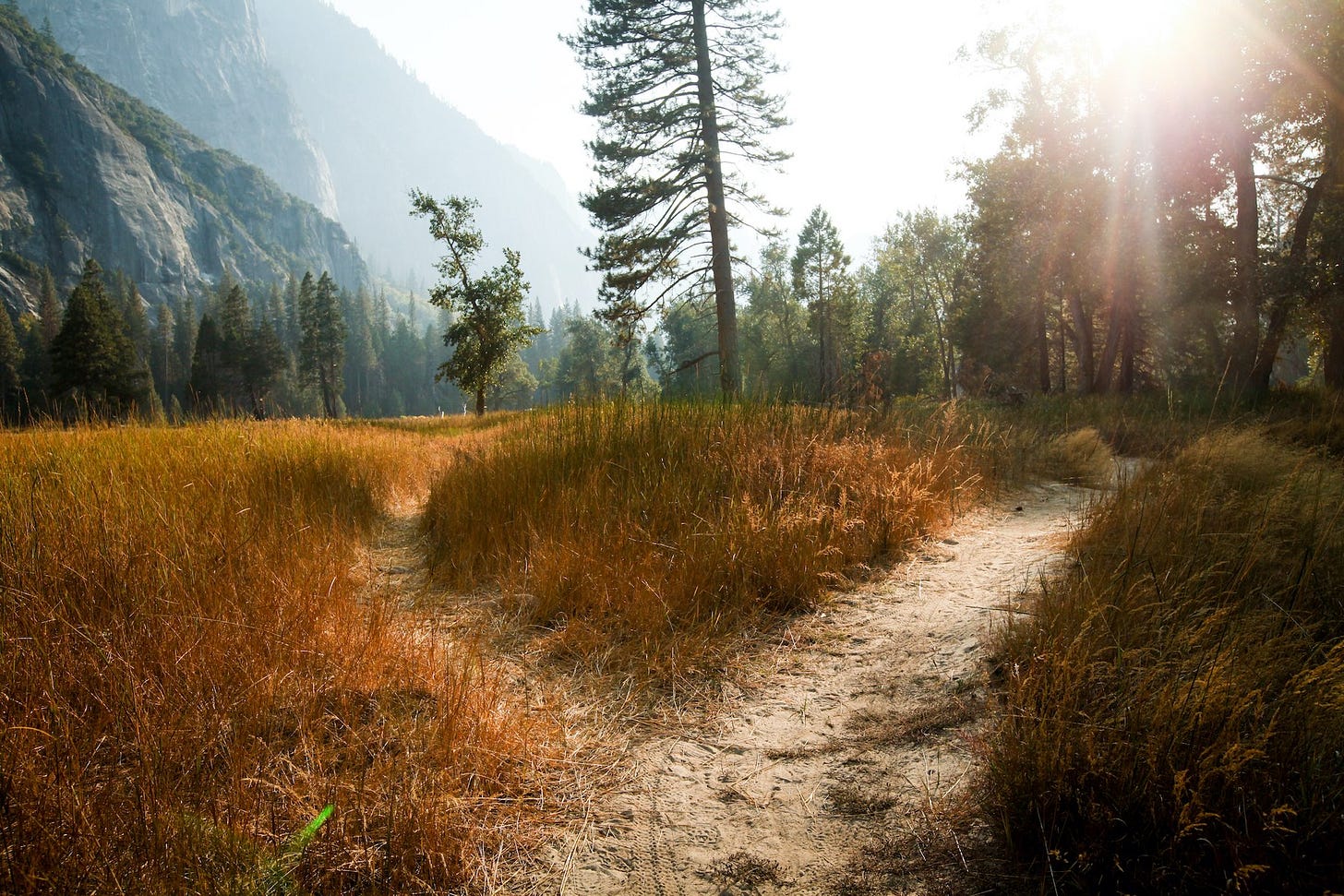How did we all get The Road Not Taken so wrong?
On Robert Frost's transgressive conservatism
I recently set myself the task of systematically reading every poem Robert Frost ever published. This amused my wife, who pointed out that it seemed unlikely that there was anything in the ratty, pencil-marked, taped and re-taped green volume of the Complete Poems of Robert Frost that has graced my bedside table ever since we were married that I haven't already read.
She was wrong, though. You know how it is with books. There's something in the way they're bound, so that whenever you flip one open in an idle moment, you somehow seem always to land on a familiar page. Sometimes this is because you have so often sought out that page that the book's spine has retained the memory, holding it on the tip of its tongue, so to speak, so as to be able to deliver it up at the merest hint of desire on your part.
Other times, it's purely a matter of chance. Big books are made up of little booklets bound together. And what with physics being the idling ne'er-do-well that it is, a book - like everything in nature, with but one exception - always takes the path of least resistance, sprawling open to one of the loose spaces between or in the middle of these booklets, whether there happens to be anything else to recommend those pages or not.
While there are many of Frost's poems that I have read dozens of times, there are others that I have never so much as clapped eyes on. The other day, for instance, in my indefatigable march from cover to cover, I came across "The Aim Was Song." What's strange is that this poem is on the facing page from "Stopping By Woods on a Snowy Evening." The latter I could recite without ever having made an effort to commit it to memory, so familiar is it. So, how could I have so often read the one and yet not the other?
Especially when the other is so delightful. It has antediluvian Man instructing the unruly, untaught winds how best to blow. Not aimlessly, or holding nothing back. But tenderly, so as to produce song. Man demonstrates how, taking in only "a little" air, and gently blowing forth "by measure":
It was word and note,
The wind the wind had meant to be -
A little through the lips and throat.
The aim was song - the wind could see.
This is, of course, very good poetry. Pure Frost. Beginning (as he once put it) in delight, and ending in wisdom. But then, on the facing page we find this:
The woods are lovely, dark and deep,
But I have promises to keep,
And miles to go before I sleep,
And miles to go before I sleep.
And suddenly it makes sense why I have never read - or, perhaps, do not remember having read - the facing poem. Because this other is pure lightning. Sixteen lines of concentrated, unrepeatable Frostian genius. The kind of stuff that reaches way, way down into the bowels of your benumbed, cynical, post-modern soul, and stirs something that you didn't even know you had within you, but that you are very relieved to find is still very much alive and capable of being moved in this way.
Somebody who has never written, or attempted to write poetry will perhaps think that I am being histrionic. "Certainly, it is a very lovely poem," they will say. "But there's nothing very special about it. Indeed, there's scarcely a word in it longer than two syllables, and not a one of them that I don't use every day before breakfast. Anybody could have written it."
But that's just the thing about Frost's poetry, isn't it? Anybody could have written it, but nobody else ever did. On the one hand, it's quite true that he only ever tells us things that we already knew...and yet, somehow, when you come to think of it, that we didn't quite know, or that somehow we forgot we knew, until he reminded us.
As it turns out, that feeling you get when you read the resolution of one of those riddle-like poems of his - "well...of course," you are tempted to murmur, despite being astonished moments earlier by the turn the poem suddenly took in the final lines - is no accident. "No tears in the writer, no tears in the reader. No surprise for the writer, no surprise for the reader," Frost wrote about his compositional methods in his incomparable essay The Figure a Poem Makes. "For me the initial delight is in the surprise of remembering something I didn't know I knew."
There is no ‘less travelled’ road
Frost in many ways is - and was viewed in his own time as - a conservative poet. It's not hard to see why. At a time when the avant-garde set were experimenting with absolutely everything, he ironically took the road less taken by doggedly keeping to the well-trodden paths of monogamy, traditional stimulants, rhyme, metre, and nature themes.
I am aware, of course, that by employing this hackneyed image of the less-travelled road in an essay on Frost, I open myself up to the charge of intolerable laziness. However, I take the risk advisedly. "The Road Not Taken" is, without doubt, the most misunderstood and misused of all of Frost's poems: quite possibly of all poems ever written. Partially for that reason, it is also the most useful for my purposes.
To shed the preconceptions drilled into us by a thousand Hallmark cards and a hundred thousand graduation speeches, and to read the poem - to read it as it actually is, and not how we wish or expect it to be - is to discover the startling fact that neither of the paths in the poem is, in fact, less travelled.
As shockingly revisionist as this claim sounds, it isn't really even a matter of debate - unless, that is, you wish to argue that you know something about the paths in question that the narrator doesn't (not an interpretive approach I advise taking). "Though as for that the passing there / Had worn [the two paths] really about the same," he clearly states at one point (in what may be the two most stubbornly ignored lines in all of English poetry). And again, "And both [paths] that morning equally lay".
The confusion, I think, arises in part from the narrator's insistence that he chose the grassy path because it "was grassy and wanted wear". But, let's not be simple-minded. The grassy path doesn't want wear because it is any less travelled. It wants wear simply because it is grassy, and grass is a pliable plant that grows right back after it is tread upon. Not so the thick undergrowth through which the other path passes.
This is what makes the narrator's reminiscences - "ages and ages hence" - in the final stanza so complex and ironical. He never really did take the road less travelled. At best, he took the road that appeared less travelled. Which renders his recollection of having taken the unpopular path little more than an idle boast.
And yet, not entirely an idle boast. Choosing the grassy path over the other really did, in some sense,"make all the difference." After all, as the narrator notes earlier in the poem, one path leads on to another, which in turn leads to another, and so on and so forth. There never really is any going back. In choosing one path, however weighty or frivolous the reasons that motivate our choice, we reject all other paths: a fact that, faced squarely, imbues every choice with an almost crushing weight.
Anyway, there it is: the poem is not the cloying valorization of individualism that Hallmark needs it to be to sell more graduation cards, but rather an ambivalent, mildly acerbic, and characteristically truthful reflection on the nature of choice and the human proclivity to rewrite the past to cast oneself as Hero.
Wisdom, not radicalism
For some, this will come as a disappointment. And yet, the attempt to conscript Frost into the role of Champion-of-Radicals always ran perpendicular to the grain of his character and artistic sensibilities. "More than once," he wrote in The Figure a Poem Makes, "I should have lost my soul to radicalism if it had been the originality it was mistaken for by its young converts." The implication, of course, is: it wasn't. So then, what was (original, I mean)?
Frost answers the question, adding wryly: "Originality and initiative are what I ask for my country. For myself the originality need be no more than the freshness of a poem run in the way I have described: from delight to wisdom." In other words, the originality of re-knowing something that he knew to be true, but had forgotten. Which, when it comes down to it, isn't a half-bad definition of wisdom. Wisdom, after all, is not (as some think) so much in the attainment of something, but much more so in the tireless preservation of a state of never-satisfied self-renewal.
Now that I think of it, isn't this another, somewhat more encouraging reading of the poem? That grassy path that drew the narrator on, what else did it have to recommend itself above the other, except precisely this uncanny combination of the old ("Though as for that the passing there / Had worn [the two paths] really about the same") and the transgressive (the path "was grassy and wanted wear")? Similarly, what else is it about Frost's poetry that leaves us feeling so soul-shattered, but this trick of his of suddenly illumining the quotidian with the eerie rays of revelation?
Looked at this way, the swagger in the final stanza need not merely be more evidence of the craven human habit of self-puffery (although it is that, at least in part), but also a kind of statement of faith: not the radical's manifesto for which it has been mistaken, but rather a manifesto of the conservative imagination, which knows that excitement and adventure and delight and (above all) wisdom are not to be found in the pursuit of novelty for novelty's sake, but rather in the exercise of looking at commonplace things for the thousandth time, in the expectation of seeing them for the very first.
Like Chesterton's white post that needs perpetual repainting in order to stay white, the grassy path is both new, and not new, requiring frequent foot traffic if it is to remain a path at all. Similarly, the truths that are truest are soon overgrown with weeds in our minds (if they were ever noticed at all), unless they are continually revisited and renewed by the cultivation of the contemplative mindset.
This, at any rate, is what Frost does for me. To read his deceptively homespun poetry is, like the narrator in “Into My Own” - that first and most sibylline of his poems - to plunge into what you thought to be a thin copse of trees - domestic, conventional, well-explored - only to find behind it a hoary forest that stretches away "to the edge of doom," awaiting discovery. And, like the narrator (who is Frost), when the others who come after catch you up, they will not find you so very much changed by the experience - certainly not beguiled by any of the fashionable ideologies of the age - but simply "more sure of all I thought was true."



